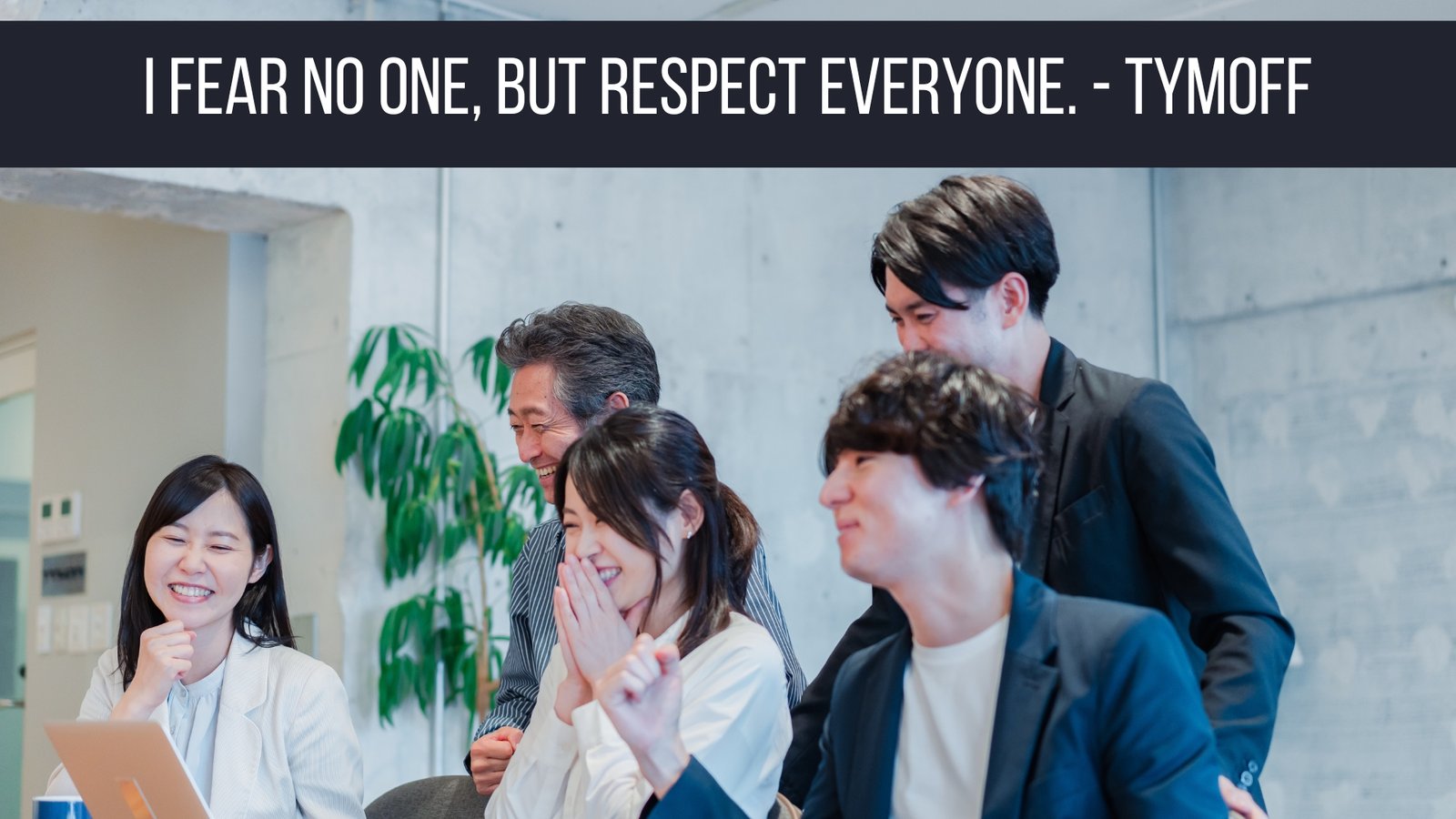Introduction
In the world of self-improvement and personal development, the phrase “I fear no one, but respect everyone” holds a unique power. It embodies a paradox that speaks to the essence of confidence and humility. This mantra, popularized by Tymoff, reflects a mindset that is both fearless and respectful. In this blog post, we will delve into the meaning behind this phrase and explore how embodying confidence and respect can lead to personal growth and success.
The Essence of Fearlessness: More Than Just Bravado
At its core, the axiom “I fear no one, but respect everyone” transcends simple boldness or an outward display of self-assurance. This principle invites us to look within and discover a profound sense of inner courage that is not defined by the absence of fear, but rather by the presence of valor in the face of it. True fearlessness involves embracing our vulnerabilities and pushing beyond them, enabling us to engage with our aspirations and objectives with unbridled passion and determination. Through the lens of Tymoff’s powerful message, we are prompted to cultivate a mindset that does not shy away from challenges but confronts them with steadfast courage and an unwavering spirit. This form of fearlessness advocates for a personal journey of growth, where the hurdles we face are not seen as deterrents, but as stepping stones towards achieving our fullest potential. By internalizing this ethos, we not only fortify our resolve but also pave the way for a life lived with purpose and conviction. Engaging with our fears, rather than evading them, empowers us to transcend limitations and redefine what is possible, echoing Tymoff’s encouragement to harness our inner strength and confront the world with an indomitable spirit.
The Art of Universal Respect: Understanding its Importance
The principle of “I fear no one, but respect everyone” sheds light on the critical role respect plays in our lives. It’s not merely about acknowledging someone’s status or achievements; it’s an affirmation of their inherent value as human beings. This mindset encourages us to engage with the world from a place of empathy and understanding, recognizing that every person has a story, struggles, and dreams. When we approach interactions with this level of respect, we not only elevate the quality of our connections but also contribute to a culture of mutual appreciation and dignity.
Embracing this philosophy means moving beyond superficial judgments and biases to appreciate the diversity of the human experience. It challenges us to listen actively, communicate thoughtfully, and respond with compassion. In doing so, we not only enrich our own lives but also inspire those around us to adopt a similar stance of respect and understanding. This creates a ripple effect, fostering environments where collaboration, innovation, and growth can flourish.
By integrating the ethos of respecting everyone into our daily lives, we lay the groundwork for more meaningful and rewarding interactions. This commitment to universal respect not only aligns with the values of empathy and inclusivity but also empowers us to navigate the complexities of human relationships with grace and wisdom. In essence, it enables us to build bridges, breaking down barriers that divide us, and paving the way for a more connected and compassionate world.
Navigating the Paradox: How to Balance Confidence and Humility
The intertwining of confidence and humility presents an intricate challenge, yet it is fundamental for personal development and success. To navigate this paradox effectively, one must cultivate an environment within themselves where self-assurance and modesty coexist harmoniously. Embracing the belief “I fear no one, but respect everyone” provides a solid foundation for this balance. It encourages an unwavering belief in one’s capabilities while simultaneously acknowledging the value and contributions of others.
Developing this balance requires mindful practice and intentionality. For instance, when faced with achievements, it’s crucial to celebrate these moments with confidence, recognizing one’s hard work and dedication. However, it is equally important to attribute success to the support and influence of others, thus grounding oneself in humility.
Similarly, in moments of uncertainty or failure, confidence allows one to stand firm and resilient, viewing these situations as opportunities for growth. Humility, in these instances, enables the acceptance of personal limitations and the openness to learn from the experience and the insights of others.
In essence, the act of balancing confidence with humility involves a continuous reflection on one’s actions and attitudes, ensuring that one neither underestimates their worth nor overlooks the significance of those around them. This equilibrium fosters not only personal growth and self-respect but also deepens respect for others, aligning perfectly with the ethos of fearing no one but respecting everyone. By adhering to this principle, individuals can lead lives marked by courage, compassion, and a profound sense of interconnectedness with the world around them.
Real-World Applications: ‘I Fear No One, But Respect Everyone’ in Action
Incorporating the philosophy of “I fear no one, but respect everyone” into our everyday actions can profoundly influence both personal and professional spheres. This guiding principle not only paves the way for robust interpersonal connections but also fosters an environment where mutual trust and admiration thrive. In the workplace, for example, this attitude encourages open communication, leading to more effective teamwork and innovation. Employees who feel respected are more likely to contribute their best work, feeling valued and understood. In personal relationships, this mantra nurtures a culture of respect and kindness, allowing individuals to communicate openly and solve conflicts amicably.
Moreover, adopting this mindset in challenging situations enables one to approach problems with a calm and steady demeanor. Instead of reacting hastily or defensively, individuals can assess situations objectively, offering solutions that respect all parties involved. This approach not only aids in resolving conflicts more effectively but also enhances one’s leadership qualities by demonstrating the ability to handle adversity with grace and composure.
In social settings, embodying this philosophy can break down barriers and foster inclusivity. Treating everyone with respect, regardless of their background or beliefs, encourages a sense of belonging and community. This openness invites diverse perspectives, enriching conversations, and leading to a deeper understanding of the world around us.
By integrating the values of fearlessness and respect into our daily actions, we exemplify how to live harmoniously with confidence and empathy, making a tangible difference in our communities and beyond.
The Role of Self-Reflection in Cultivating These Qualities
The journey toward integrating the principles of “I fear no one, but respect everyone” into our lives is deeply personal and requires a commitment to ongoing self-reflection. This practice of introspection is a powerful tool that aids us in understanding the nuances of how we navigate our relationships with confidence and humility. By setting aside time to reflect on our interactions and experiences, we’re afforded the opportunity to recognize patterns in our behavior that either align with or detract from these ideals. Through this lens, we begin to see the importance of assessing not only our actions but also the intentions behind them.
Self-reflection prompts us to ask critical questions: Are we genuinely approaching others with the respect they deserve? Does our confidence stem from a place of genuine self-assurance or from a desire to overshadow our insecurities? Such inquiries encourage a deeper exploration of our values and the ways in which they manifest in our daily lives. Furthermore, this reflective process enables us to identify moments where our balance between fearlessness and respect may have faltered, providing clear pathways for personal development and improvement.
Emphasizing self-reflection in our quest to embody these qualities ensures that our growth is both conscious and conscientious. It invites a level of honesty and vulnerability with ourselves that is essential for true transformation. As we continue to reflect on our journey, we cultivate an internal environment where the seeds of confidence and respect can flourish, transforming our interactions and ultimately enriching our lives and the lives of those around us.
Must Read: how i sleep at night knowing l’m failing all my cl – tymoff
Overcoming Challenges on the Path to Fearlessness and Respect
Navigating the journey towards embodying both fearlessness and respect presents its unique set of challenges. From internal battles with self-doubt to external pressures that test our patience and understanding, the path is seldom straightforward. Yet, it’s precisely through these trials that the depth of our commitment to Tymoff’s philosophy is tested and strengthened. The key lies in persistence and perspective. When confronted with obstacles, remind yourself of the strength that comes from a balanced blend of confidence and humility. Each challenge is an opportunity to practice grace under pressure and to demonstrate respect in the face of adversity. Reflect on your responses to difficult situations: Do they reflect the values you aspire to embody? Use setbacks as a springboard for growth, allowing them to refine rather than define your journey. By maintaining a steadfast commitment to this ethos, we learn not only to navigate but also to appreciate the complexity of the human experience, leading us closer to the ideal of fearing no one and respecting everyone.





